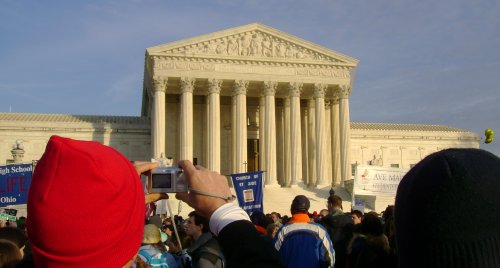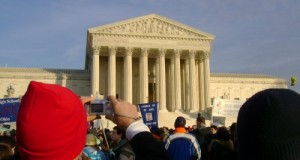Tagged
Health care reform bill upheld

The Supreme Court of the United States upheld almost everything that the health care reform bill does. The only thing the Court disallowed was removing all Medicaid funds from States who refuse to expand their Medicaid programs. This opinion severely weakens the Constitution and grants Congress unlimited power to tax. But it also means that all who vociferously denied that the health care reform bill had a tax increase in it, were lying.
Health care reform bill opinion
The Supreme Court released a 193-page opinion under the title National Federation of Independent Business et al. v. Sebelius et al. The Court combined that case with two separate certiorari petitions in the case of Florida et al. v. HHS et al.
The two questions that the Court had to decide were:
- May the Congress force people to buy something, or else pay a money penalty? (And what do you call that penalty? Is it a tax or a fine?)
- May the Congress force a State to expand a massive charity program (Medicaid), and withdraw all the funds they now send to that State if it does not?
Besides that,the Court had to ask whether the health care reform bill could stand if any part of it could not stand. When Congress passes a law, they usually put in a line to say that if a court holds one part of the law unconstitutional, the rest of the law can stand. Lawyers say that they make the parts of the law severable. Congress did not do that in the health care reform bill. In fact, they took out a severability line that they had earlier put in.
The Court;s answer: Yes, Congress can make you buy health insurance, but not for the reason Congress first said. Chief Justice John Roberts explained it (or tried to). According to him, the “Commerce Clause” does not let Congress force anyone to buy something they wouldn’t otherwise buy. But the Tax Clause lets Congress tax anyone, for any reason.
Roberts took note that the health care reform bill called its “Minimal Coverage Mandate” a penalty and not a tax. Because Congress did that, the government could not argue that the Anti-Injunction Act made the lawsuit premature. (The Anti-Injunction Act says that a taxpayer can’t sue to stop a tax until he has first paid it.) But Roberts said that whatever Congress chose to call it, it was a tax if that’s what it took to save the law. The Syllabus clearly says:
Because “every reasonable construction must be resorted to, in order to save a statute from unconstitutionality,” Hooper v. California, 155 U. S. 648, 657, the question is whether it is “fairly possible” to interpret the mandate as imposing such a tax, Crowell v. Benson, 285 U. S. 22, 62. Pp. 31–32.
Roberts decided that it was. He also decided that he could in effect rewrite a statute.
In answering that constitutional question, this Court follows a functional approach,“[d]isregarding the designation of the exaction, and viewing its substance and application.” United States v. Constantine, 296 U. S. 287,
294. Pp. 33–35.
On point 2 above, Roberts said that Congress had no authority to withdraw all Medicaid funds from a State that did not expand its Medicaid program. The reason: Congress cannot make a State do anything.
Finally, the Court seemed to assume that the parts of any law were always severable, whether the law itself says so or not.
What the opinion really means

The United States Supreme Court, with several March for Life participants in the foreground. Photo: CNAV files
Obviously the opinion means that the health care reform bill stands, except that the Medicaid penalty does not stand. But it means something worse than that: Congress may tax anyone, for any reason, to force him or her to do anything it wants. Even if the government cannot fine a person, it can tax that person. Furthermore, the government can tax wherever it may not fine.
This is a blank check for the government. It destroys almost all the protections that a person now enjoys. All the government has to do, to fine a person (in any amount) for any reason or no reason, is to call the penalty a tax instead of a fine. The government can also be as selective as it wants in deciding whom to tax, and whom not to tax, and why or why not. (Roberts also said that because the “minimum coverage mandate” did not apply to everyone, whether they acted or no, it was not a capitation tax and the government need not apportion it like one.)
Therefore, any American citizen or lawful resident might be subject to a bill of attainder, an ex post facto penalty, or any kind of “excessive fine.” The only things that the government may not do as arbitrarily are:
- To execute someone, or
- To confine someone.
Chief Justice Roberts just gave the government the perfect workaround: call it a tax!
How people take this
Barack Obama’s legal eagles argued in court that the mandate was a tax. But Obama, and every Democratic politician, had told the people that it was not a tax. Now that the Supreme Court said it is a tax, they don’t want to talk about that. When Obama gave his victory speech earlier this afternoon, he ignored completely the fine print that called his mandate a tax. He read out a “winner’s speech” that he must have written ahead of time. It was as if he did not even read Chief Justice Roberts’ opinion.
Mitt Romney saw only one thing: he has a campaign issue. He gave a campaign speech and vowed to repeal and replace the health care reform bill as soon as he became President. (And according to The Daily Caller, he raised a million dollars within three hours after the ruling came down.)
Senator Chris Coons (D-DE) brazenly said that the Court, in upholding the health care reform bill, “struck a balance between individual liberty and caring for our fellow man.”
Political expert Dick Morris said that this ruling could hurt Obama in the election. Most voters do not like the health care reform bill. Now, says Morris, the people know that the only way to get rid of the health care reform bill is with their vote. (In his victory speech, Obama talked as if the Supreme Court had just given the American people a court order to accept his health care reform bill and not even try to change it.)
Virginia Attorney General Ken Cuccinelli has his own anti-health care reform bill lawsuit still pending. He called today’s ruling a “dark day for American liberty.”
This unprecedented decision says that Congress has the authority to force citizens to buy private goods or face fines — a power it has never had in American history, and a power King George III and Parliament didn’t have over us when we were mere subjects of Great Britain.
Clearly Cuccinelli understands that, fine or tax, a mandate is a mandate. The Court, by letting it stand, gave the government power without limit.
Preparing to fight back
Reince Priebus, head of the Republican National Committee, said, “The fight’s not over.”
America needs real health care reform, and that means repealing [the health care reform bill].
The Tenth Amendment Center has a Federal Health Care Nullification Act that any State may pass to challenge Federal power directly.
Within hours, Rep. Michele Bachmann (R-MN) vowed in a fund-raising e-mail to press to repeal the health care reform bill.
New Jersey Tea Party favorite Anna Little quickly tied her opponent, Rep. Frank J. Pallone Jr (D-NJ-6), to the health care reform bill. She called for entirely different health care reforms:
- Free markets in health insurance.
- Tort reform, to restrain lawsuits for “medical malpractice.”
- Letting insurers sell insurance across State lines.
- Letting people set up Health Savings Accounts so that more people could self-insure.
- Stop protecting insurance companies against the usual anti-trust laws.
[amazon_carousel widget_type=”ASINList” width=”500″ height=”250″ title=”” market_place=”US” shuffle_products=”True” show_border=”False” asin=”B00375LOEG, 0451947673, 0800733940, 0062073303, 1595230734, 1936218003, 0981559662, 1935071874, 1932172378, 1936488299″ /]

Terry A. Hurlbut has been a student of politics, philosophy, and science for more than 35 years. He is a graduate of Yale College and has served as a physician-level laboratory administrator in a 250-bed community hospital. He also is a serious student of the Bible, is conversant in its two primary original languages, and has followed the creation-science movement closely since 1993.
-

 Executive4 days ago
Executive4 days agoSecret Service chief gets no solace
-

 Executive3 days ago
Executive3 days agoWaste of the Day: Louisville Taxpayers Pay Nearly $600,000 For Empty Building’s Maintenance, Security
-

 Guest Columns4 days ago
Guest Columns4 days agoFear Itself: Democrats’ Favorite Strategy Caused Their Current Chaos
-

 Executive3 days ago
Executive3 days agoWhere is Joe Biden – or Jill?
-

 Executive1 day ago
Executive1 day agoWaste of the Day: Throwback Thursday: Cities Used Crime Prevention Funds on Soccer Games, Paper Shredding
-

 Executive2 days ago
Executive2 days agoFacile and politically motivated suggestions
-

 Civilization4 days ago
Civilization4 days agoBuild Iron Dome in the United States To Prepare for Israel’s Worst Day
-

 Executive4 days ago
Executive4 days agoThe Emerging GOP Plan To Beat Kamala Harris



Personally, I’m glad that withdrawing medicaid from states refusing to expand medicaid was ruled unconstitutional.
That’s like saying, “Hey, you don’t want to help more sick people? Then you don’t get to help any sick people!”
CNAVS:
This decision was certainly a stab in the back by the Supreme Court – especially coming from the Chief Justice. As you stated:
“Chief Justice Roberts just gave the government the perfect workaround: call it a tax!”
The majority certainly weren’t decisive but chose to keep the status quo and help politicians run this country down the proverbial sewer drain with their continued taxing and spending. This 5-4 ruling just gave many unworthy politicians the green light. All they have to do now is legislate nonsensical laws and label it a tax. Here, following, is my further take on this irresponsible Supreme Court rendering:
“Has the Supreme Court Opened a Pandora’s Box of Unintended Consequence Worms?”
link to moralmatters.org
Here’s a suggestion – why don’t you, Roseann and Nicholas take this test and publish your results
link to healthreform.kff.org
Let’s see how much you actually know about Obamacare. No cheating now!
Consider the source! We would likely end up disputing the premises of at least half the questions.